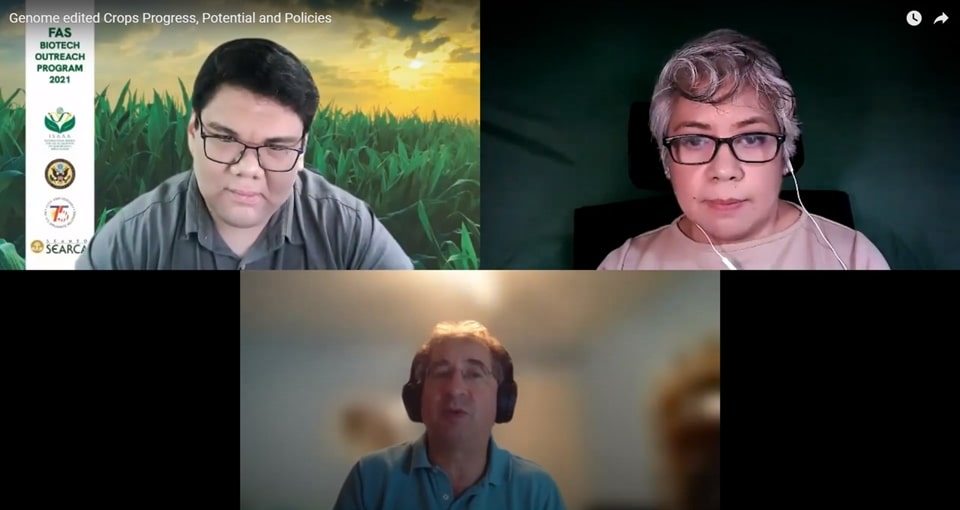SEARCA teamed up with the USDA Foreign Agricultural Service, United States Embassy Manila, and the International Service for the Acquisition of Agri-biotech Applications (ISAAA) for a virtual webinar for law practitioners entitled Genome-edited Crops: Progress, Potential, and Policies held on 10 August 2021. The learning event was organized in collaboration with the Philippine Judicial Academy (PHILJA) and the Philippine Association of Law Schools (PALS).
Atty. Gregory Jaffe, Director of the Project on Biotechnology from the Center for Science in the Public Interest in Washington DC, and Atty. Paz J. Benavidez II, Independent Policy, Institutional, Legislative & Legal Consultant, provided an overview of international policy considerations as well as the Philippine regulatory framework on genome editing. The presentations were followed by a discussion of concerns raised by participants on health and environmental safety of genome-edited crops, labeling of genetically modified (GM) products, regulatory policies, and intellectual property rights of GM crops.
 Project Coordinator II from SEARCA’s Research and Thought Leadership Department (RTLD), Mr. Jerome C. Barradas along with resource speakers, Atty. Paz J. Benavidez II (right) and Atty. Gregory Jaffe (below) during the open forum.
Project Coordinator II from SEARCA’s Research and Thought Leadership Department (RTLD), Mr. Jerome C. Barradas along with resource speakers, Atty. Paz J. Benavidez II (right) and Atty. Gregory Jaffe (below) during the open forum.
Morgan Haas, the Agricultural Counselor of the USDA Foreign Agricultural Service acknowledged the pivotal role of the judiciary in ensuring that Filipinos will reap the benefits of biotechnology. “It is our hope that as the Philippines continues to embrace the technology moving forward, there is a regulatory structure in place that is well-written and clear of misinterpretations,” he continued.
Haas cited the Philippines’ position as a biotechnology leader in Southeast Asia, particularly, being a co-sponsor of the International Statement on Agricultural Applications of Precision Biotechnology held at the World Trade Organization in 2020.
 Morgan Haas from the USDA Foreign Agricultural Service and Justice Jose Reyes, Jr. from PHILJA give their messages during the webinar.
Morgan Haas from the USDA Foreign Agricultural Service and Justice Jose Reyes, Jr. from PHILJA give their messages during the webinar.
Meanwhile, Justice Jose C. Reyes, Jr., Chair of PHILJA’s Department of Special Areas of Concern, appreciated the current intensification of sharing science-based information on biotechnology with the public. “Let us initiate efforts within our circles of influence to learn by ourselves and to be interested and generous to share to lay people who may have biases or wrong notions about biotechnology,” he stated.
“It is important for members of the judiciary to know and be able to use science and evidence-based information within regulatory frameworks. Biotechnology is not new, but we just need to know more about it and discover its potential benefits,” Justice Reyes added.
This webinar is part of a series that aims to equip different key stakeholders like members of the judiciary along with lawyers and law students with knowledge on biotech crops and biosafety regulations, particularly on genome editing technologies. The objective is to enable them to have informed decisions based on science and evidence that will potentially usher to the advancement of the country’s agriculture sector. More than 360 participants from PHILJA, PALS, and court staff and officials from all over the country attended the webinar.